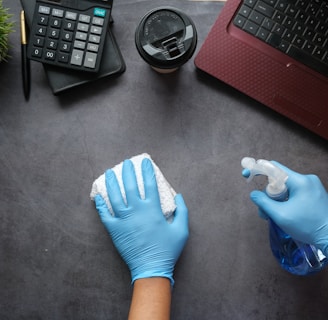Growing Health Concerns Linked to Poor Hygiene
Cleanliness is More Important Than Ever
9/5/20243 min read


In our fast-paced, interconnected world, maintaining hygiene often takes a backseat to other priorities. However, the importance of cleanliness cannot be overstated, especially when it comes to safeguarding health and well-being. Poor hygiene practices—whether at home, in workplaces, or in public spaces—can lead to a range of health problems, some of which are serious or even life-threatening. As concerns about hygiene and its impact on health grow, it’s crucial to understand why maintaining a clean environment is more important than ever.
1. The Link Between Hygiene and Disease
The connection between poor hygiene and illness has been well-documented for decades. Germs and bacteria thrive in dirty environments, and when these microorganisms spread, they can cause infections, allergies, and other diseases. Common illnesses like colds, flu, and stomach infections often originate from unclean surfaces, contaminated food, or poor hand hygiene. In extreme cases, inadequate cleanliness can lead to outbreaks of more severe illnesses, such as salmonella, E. coli, and even antibiotic-resistant infections.
2. The Rise of Allergies and Respiratory Issues
A lack of hygiene contributes to the buildup of dust, mold, and allergens in homes and workplaces, leading to an increase in respiratory issues and allergies. Indoor air quality, which is directly affected by cleanliness, plays a significant role in health. Unclean environments can exacerbate conditions like asthma, bronchitis, and other respiratory disorders. For children, the elderly, and individuals with weakened immune systems, the risks are even higher.
3. Hygiene in the Workplace: A Key to Employee Health
Workplaces are breeding grounds for germs due to shared spaces and high-touch surfaces like keyboards, doorknobs, and office equipment. Poor hygiene in these environments can lead to the rapid spread of illnesses, resulting in employee absenteeism and reduced productivity. Employers who neglect hygiene not only put their teams at risk but also face financial losses from frequent sick leaves and decreased workplace morale.
4. The Role of Hygiene in Mental Health
While physical health is often the primary focus, poor hygiene also has a significant impact on mental well-being. Living or working in a cluttered, unclean environment can lead to increased stress, anxiety, and a general feeling of unease. On the other hand, maintaining a clean space promotes a sense of order, reduces stress, and enhances overall mental clarity. Cleanliness can even foster a more positive mindset and improve motivation, especially in work and study environments.
5. Hygiene Concerns in Public Spaces
As urban areas become more crowded, maintaining hygiene in public spaces has become a growing challenge. Unsanitary conditions in public transport, restrooms, and communal areas increase the risk of disease transmission. In recent years, global health crises like the COVID-19 pandemic have highlighted the critical need for strict hygiene practices in public spaces to curb the spread of infections.
6. The Importance of Education and Awareness
Many hygiene-related health issues arise due to a lack of awareness or understanding about proper cleaning and sanitation practices. Educating individuals about the importance of hygiene—such as washing hands regularly, disinfecting high-touch surfaces, and maintaining clean surroundings—can go a long way in reducing health risks. Schools, workplaces, and communities play a pivotal role in spreading awareness and fostering a culture of cleanliness.
7. How Professional Cleaning Services Can Help
Maintaining hygiene, especially in large or busy spaces, can be overwhelming. This is where professional cleaning services step in. A trusted cleaning company ensures that every corner of your home, office, or commercial space is thoroughly sanitized and free from harmful germs. Professionals use advanced tools and eco-friendly products to clean effectively while ensuring safety. Regular cleaning not only creates a healthier environment but also saves time and effort, allowing you to focus on other priorities.
8. Prioritizing Hygiene: A Collective Responsibility
The responsibility of maintaining hygiene lies with everyone. Individuals, families, businesses, and governments must work together to create cleaner environments and healthier communities. Simple steps like routine cleaning, using disinfectants, and proper waste management can collectively make a significant difference in reducing health risks.
Final Thoughts
As concerns about hygiene and its impact on health continue to grow, now is the time to prioritize cleanliness in every aspect of our lives. Clean environments not only prevent the spread of diseases but also promote physical and mental well-being, fostering healthier and happier communities.
At [Your Cleaning Company Name], we are committed to helping you maintain the highest standards of hygiene. Whether it’s your home, office, or public space, our professional cleaning services ensure a safe and healthy environment for you and your loved ones. Let’s work together to tackle the challenges of poor hygiene and create a cleaner, healthier future for all.
Contact us today to learn more about our services and how we can help you take the first step toward better hygiene and health!
